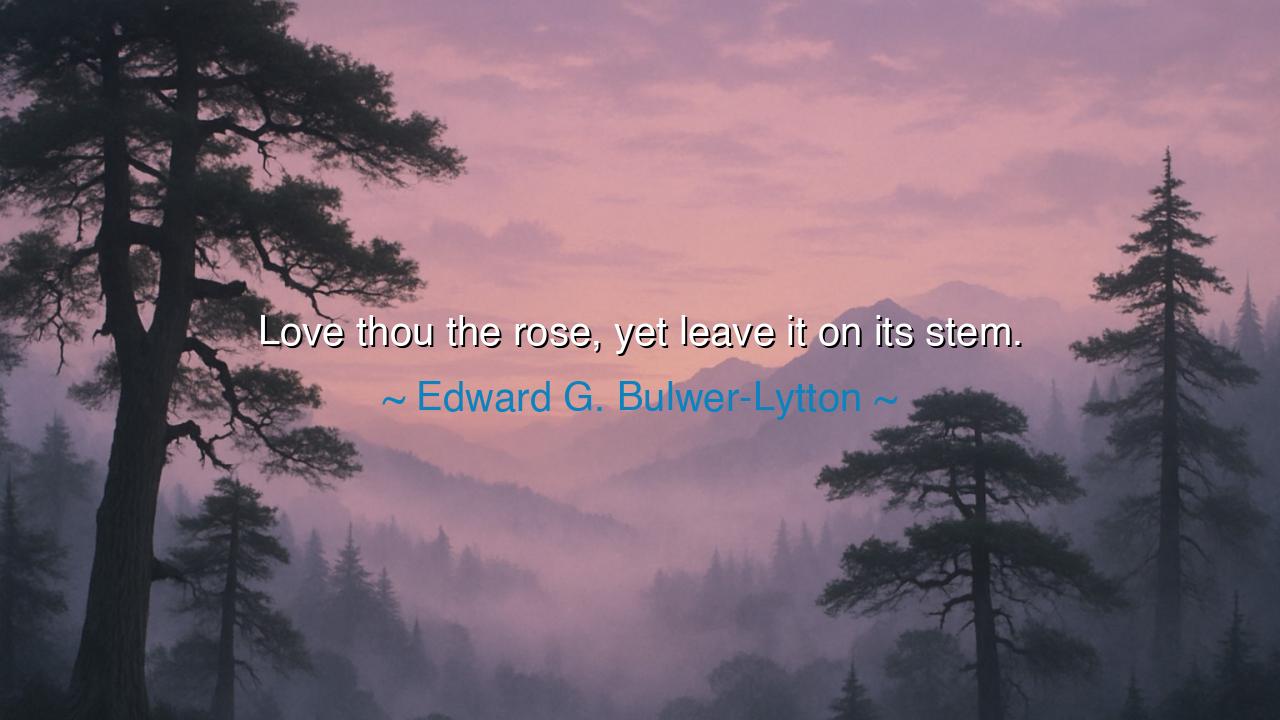
Love thou the rose, yet leave it on its stem.






Hear the delicate wisdom of Edward G. Bulwer-Lytton, who counseled: “Love thou the rose, yet leave it on its stem.” In this brief but profound saying lies the eternal balance of love—adoration without possession, reverence without destruction, joy without grasping. For the rose, symbol of beauty and tenderness, thrives only when allowed to remain rooted in its life-giving soil.
To love the rose is to delight in its fragrance, its color, its form, and its presence. It is to open the heart in wonder and gratitude for beauty that exists outside oneself. Yet to tear it from its stem is to cut short its life, to destroy what one desires in the very act of taking it. Thus, Bulwer-Lytton warns that true love is not the hunger to possess, but the courage to let beauty be free.
This wisdom speaks to the nature of human affection. Too often, love becomes possession—the desire to control, to bind, to claim as one’s own. Yet in so doing, one suffocates the very essence of what is loved. Just as the rose withers when plucked, so too does love wither when reduced to ownership. The truest form of devotion is respect for the beloved’s life, freedom, and wholeness.
The saying echoes the teachings of poets and sages across ages, who saw that love’s highest form is not desire fulfilled, but reverence preserved. The mystics of the East, the philosophers of Greece, and the troubadours of the West all sang the same truth: to love is to honor, not consume; to cherish, not devour. Bulwer-Lytton’s rose is but another voice in this timeless chorus.
Thus let the lesson endure: love the rose, but leave it on its stem. Behold beauty with open heart, yet do not destroy it through selfish grasping. In restraint is reverence; in reverence is life. This is the wisdom of love that does not cling, but blesses, allowing both the lover and the beloved to flourish, unbroken and free.






Q922.nguyen thi Kim quyen 9a4
Bulwer-Lytton’s quote seems to capture the essence of appreciating something without the need to take it for ourselves. It’s about honoring the beauty of love without clinging to it. But in relationships, how do we manage the tension between love and freedom? Can we truly love someone deeply while respecting their autonomy, or do we risk unintentionally stifling them by trying to keep them close? What’s the key to this balance?
NTNguyen Tram
This quote seems to speak to the importance of balance in love. The rose symbolizes something beautiful, yet it’s meant to stay rooted, suggesting that love should allow others the space to flourish on their own terms. Do you think that love is most profound when we can love without attachment or expectation? How do we practice this in our daily lives without falling into the trap of possessiveness?
DCLE THI DIEU CHAU
I find this quote both beautiful and thought-provoking. It suggests a kind of love that is gentle and respectful, where we can admire something or someone without seeking to control it. In today’s world, it seems we often want to possess or define love. What would it look like to love someone—or something—without trying to change them, just allowing them to exist as they are, like the rose on its stem?
Sson
Edward G. Bulwer-Lytton’s words make me think about the fleeting nature of beauty and love. The rose represents something precious, yet the advice is to appreciate it in its natural state, without interference. Does this mean love is most powerful when it’s given freely and without trying to change or possess the other person? Is it a reminder to let go and not hold on too tightly to what we cherish?
Y842 Vo Ngoc Nhu Y 8A5
This quote strikes me as a metaphor for appreciating beauty without possessiveness. It seems to suggest that we can love something deeply without trying to own or change it. In relationships, is it possible to love someone fully while still respecting their independence? How do we balance our love for others with the understanding that they, like the rose, must remain true to themselves and their own growth?